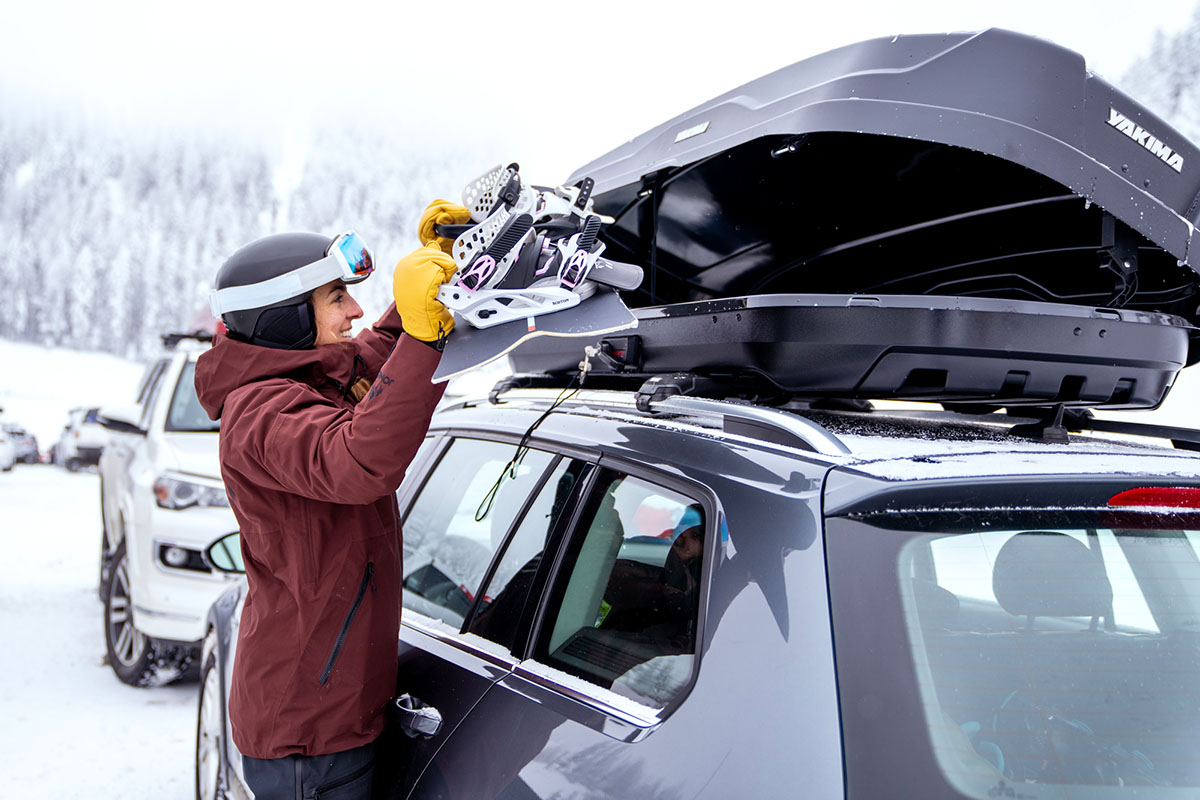
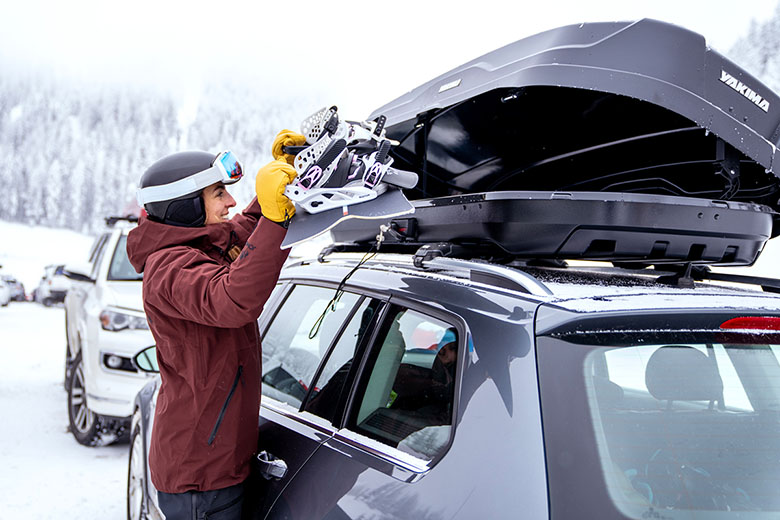
Price: $749
Gear capacity: 16 cu. ft.
Weight: 47 lb.
What we like: Very easy to install, long-lasting build, and maximizes interior space with a tall nose and flat floor.
What we don’t: We’ve had issues with the locks icing up in winter; size up to the NX 18 model if you want to carry skis.
See the Yakima SkyBox NX 16
The roof box market is a pretty stagnant space, so it’s notable when a big-time product gets a revamp. And that’s just what happened with the SkyBox NX, which effectively replaces the Carbonite model in Yakima’s lineup. Offered in 16- and 18-cubic-foot designs, we tested the smaller of the two capacities throughout a full four seasons of driving. The takeaway: Yakima’s latest effort is better-made, and the flatter floor is a boon for hauling bulky items, but it’s not a total home run. Road noise increased, and we experienced icing issues with the new key system in winter. Below we break down our experiences with the SkyBox NX 16. To see how it stacks up to the competition, check out our article on the best rooftop cargo boxes.
As a longtime user of the outgoing Carbonite 16, I was happy to see that Yakima addressed many of my complaints with the updated SkyBox NX 16. First and foremost is the floor of the interior, which is significantly flatter in the NX thanks to the new mounting hardware system. The low-profile design clears up substantial space and makes life easier when hauling rigid items like suitcases, as well as taller gear like tents, camp chairs, and kids’ bikes. Additionally, the revised shape of the box—including a taller profile, blunter nose, and floor that’s lower at the front and rear—allows for bulkier items to squeeze in at either end. All told, it’s proven to be an ideal capacity and shape for camping trips for a family of four, 3,000-mile-plus road trips (where it held duffels and items we didn’t need close at hand), and as a space to store wet and dirty gear after beach days, bike rides, and more.
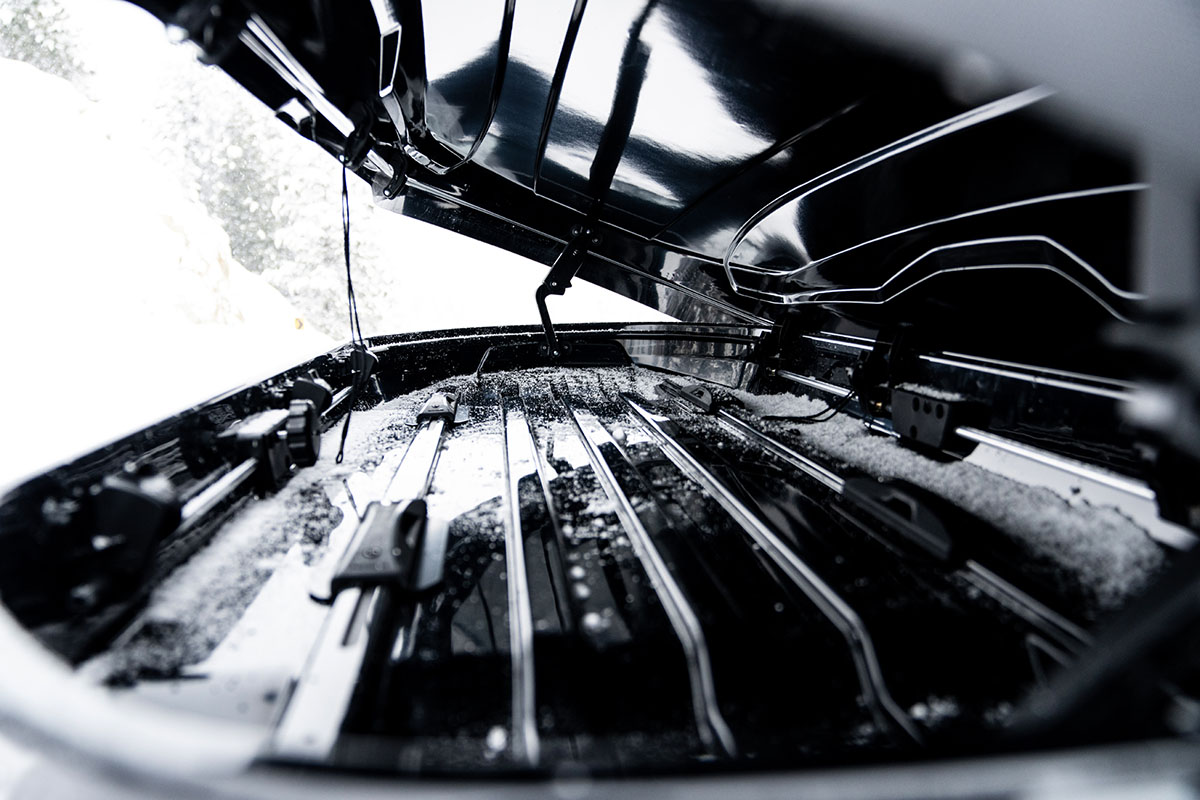
All that said, if you’re a winter sports enthusiast, we highly recommend stepping up to the larger NX 18 model. Unlike the old Carbonite box, the new NX 16 is a bit shorter and correspondingly more limited in its ability to haul skis. Yakima lists the maximum length at 175 centimeters for the 16 (the NX 18 can carry up to 195cm), and we found that to be true. We could squeeze a pair of 180-centimeter skis at an angle, but you’d be hard-pressed to get anything more in there without risking ski-to-ski damage. For us, this was a notable downside to the updated model—we don’t necessarily need a larger box, but we’d like the ability to carry multiple pairs of skis. That said, snowboarders and/or those who don’t need the extra length should be plenty happy with the more compact shape.
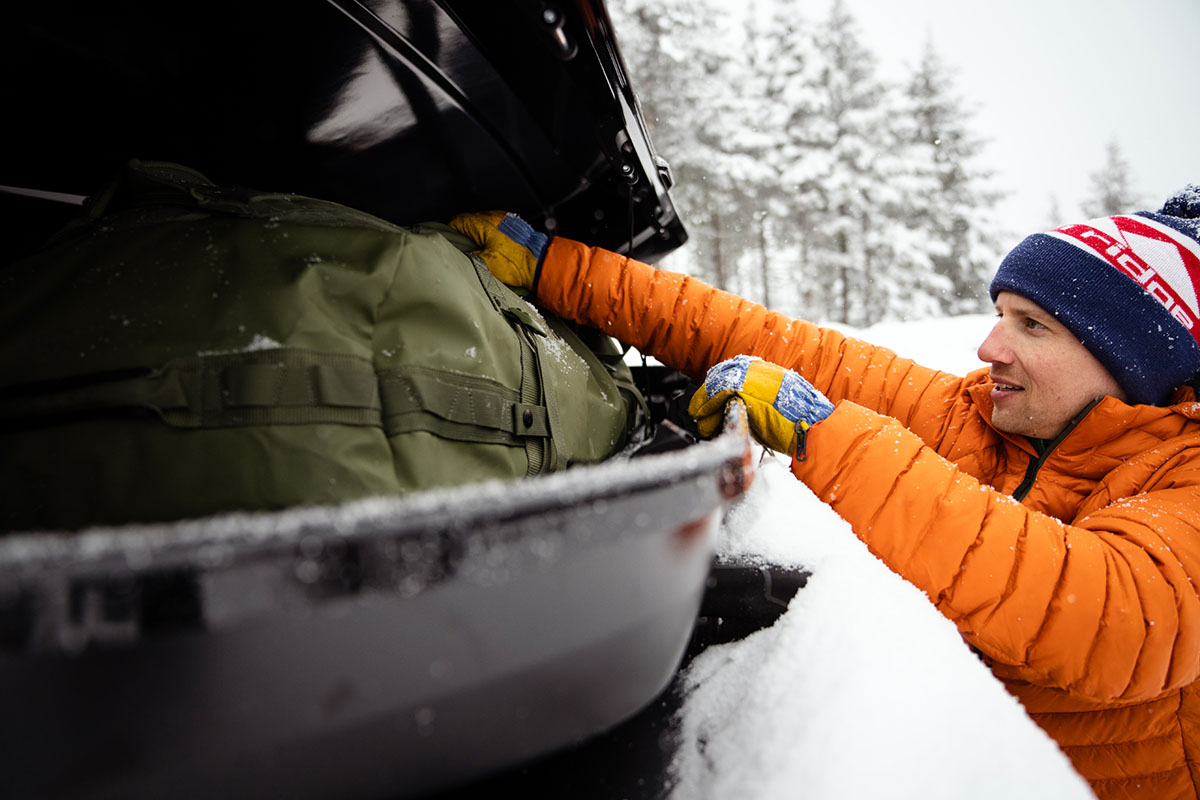
As I touched on above, the new SkyBox has different all-around dimensions from the outgoing Carbonite model. It’s now 5.5 inches shorter at 75.5 inches in length, similarly wide at 35 inches, and a little taller at 16 inches. This comes with some notable benefits: The shorter length makes it easier to avoid interference with your vehicle’s rear hatch—it was extremely easy to fit the box on three very different-sized wagons and SUVs (a Volkswagen Golf Alltrack, Jeep Grand Cherokee, and Subaru Ascent). As always, it’s worth consulting Yakima’s fit guide to make sure it will work on your vehicle, but the compact length and significant amount of fore and aft adjustability (more on this in “Installation and Removal” below) means that it should work with the vast majority of vehicles on the market.
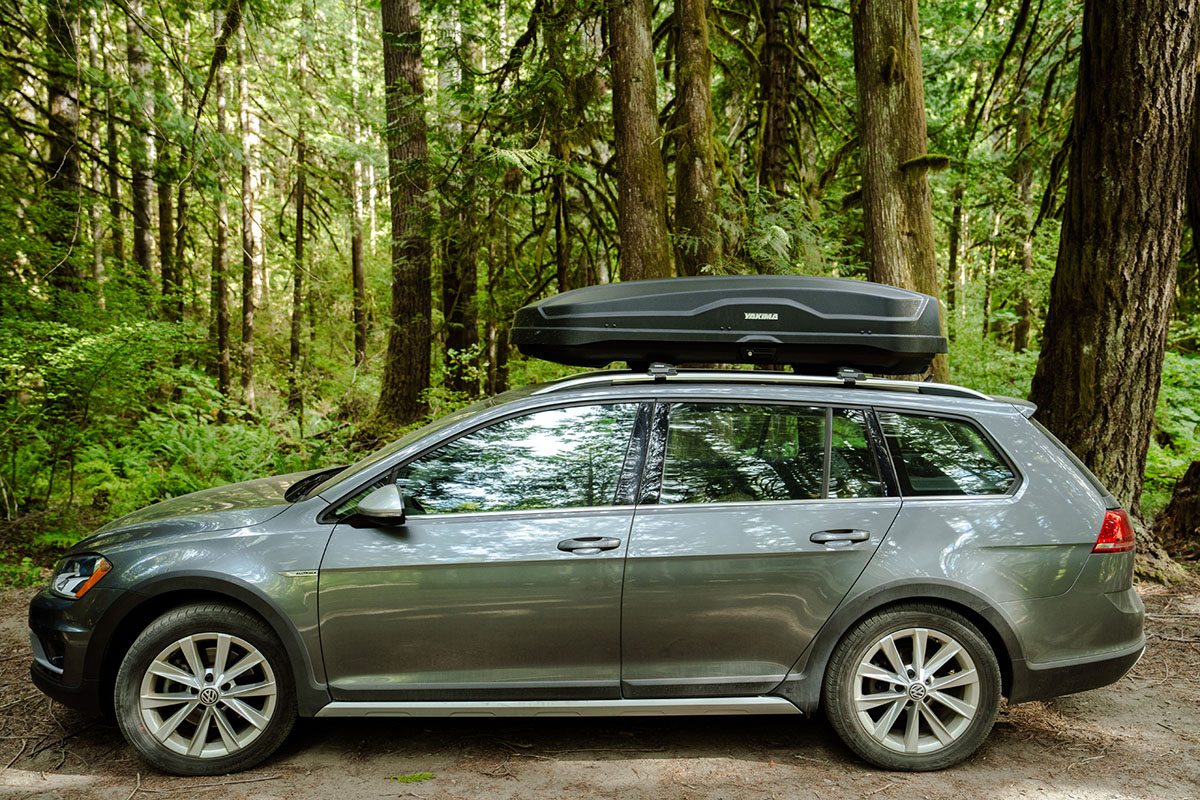
We also appreciate the 1-inch-taller height of the NX, and the elevated nose and nearly flat floor offer more evenly distributed space inside—great for hauling bulky camping items. Additionally, its 36-inch width works well with a narrow vehicle like my Alltrack, and those with larger vehicles with wider cross bars have the option to tack on additional accessories like a bike rack.
For weight, the SkyBox NX 16 tips the scales at 47 pounds, which is roughly average in the roof box space. The SkyBox’s primary competitor, the Thule Force XT L, comes in a little lighter at 41 pounds, while Yakima’s more feature-rich GrandTour 16 is a bit heavier at 51 pounds 8 ounces. As expected from such a large and heavy item, it’s much easier to move and install the SkyBox on a roof with a partner. Finally, it’s worth calling out that both your rack system as well as your specific vehicle will have maximum weight limits. But at 47 pounds, the SkyBox leaves plenty of leeway for hauling fairly heavy items (for reference, my Thule rack can handle 165 lb., and my vehicle’s roof is rated for the same).
A big reason to step up to a mid-range design like the Skybox NX is its quality hardware and dual access to the interior. With a sturdy metal handle and integrated lock on each side of the box, it’s super easy to open and reach items that you may have tucked away. The box opens the full length of the interior, and we found the opening is generous enough to squeeze in bulky gear like a double-wide camping mat (Exped’s MegaMat Duo 10) or even a small kids’ bike. And for closing, each side has a string that hangs down in the middle that you can grab if the opened box is too high and difficult to reach.
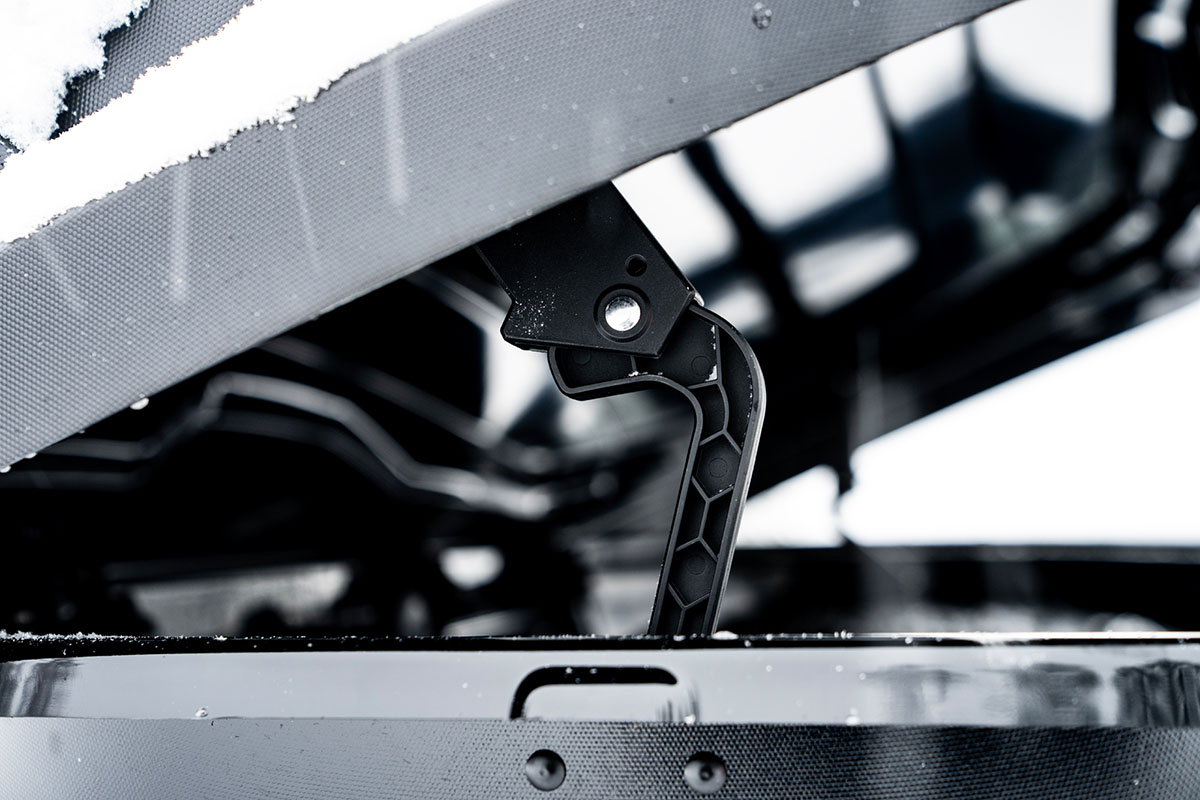
One complaint we had with the discontinued SkyBox Carbonite 16 was its stiff handle that required quite a bit of downward force to release. The good news with the latest SkyBox is that it’s noticeably easier to open—it still requires some leverage, but it’s something we’ve been able to accomplish one-handed throughout the year (even on cold and snowy winter days). Unfortunately, we’ve had less luck with the updated key design, which iced up on us on several occasions. It’s never gotten to the point where we weren’t able to eventually warm the key core and wiggle the key in to unlock the box, but the issue been a real annoyance each time and has delayed our departure from the ski hill by a few minutes. Of note: This wasn’t an issue with our old Carbonite, which also had an SKS key system, so the revamped all-metal handle design seems to be the culprit.
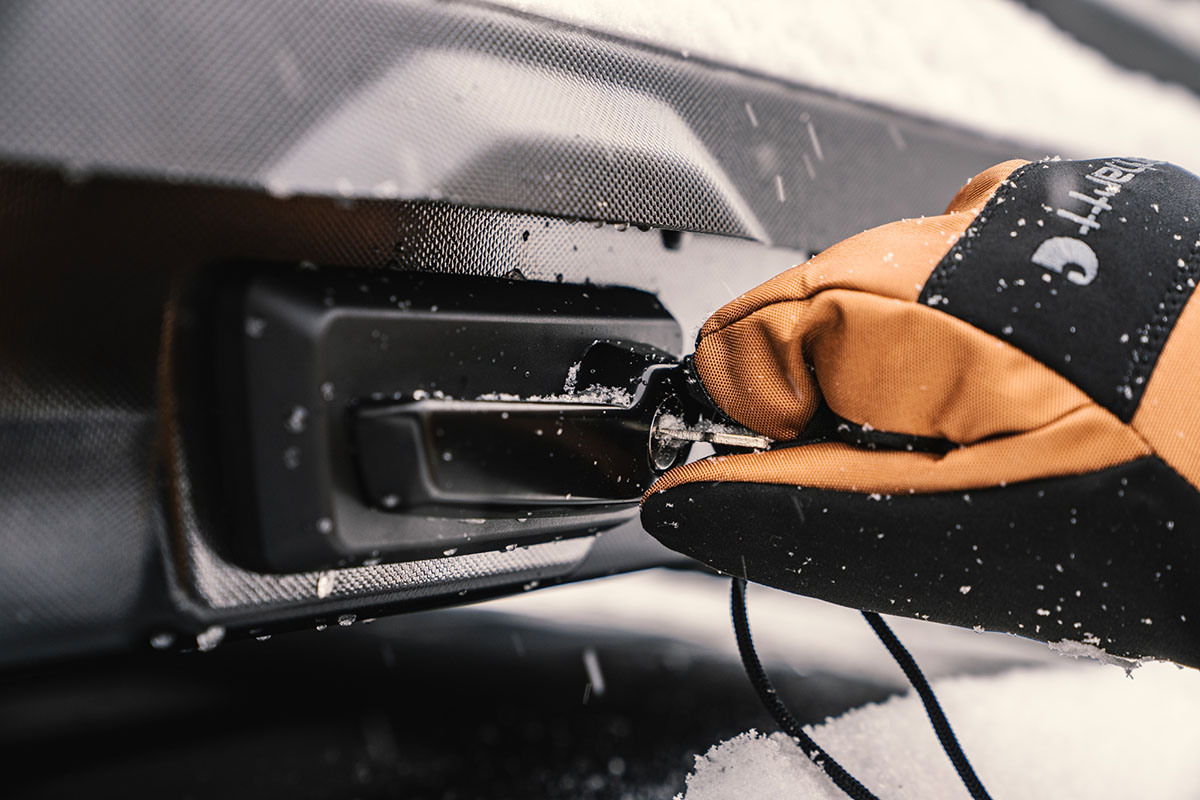
Throughout nearly a year of testing and well over 10,000 miles of driving, the Yakima SkyBox NX 16 has seen everything from pelting rain to blowing snow and 100+ degree heat. And outside of the annoying key core freezing issue detailed above, the box has performed flawlessly. The level of water resistance has been especially impressive: The upper portion of the lid hangs over the lower section and creates an effective seal that hasn’t leaked to date. But in direct sun and heat, you’ll want to be mindful of what you store up there. The combination of no openings to release air and the black exterior means a lot of hot air comes out when you open it after driving on a sunny day. But overall, this is a fairly minor complaint, and I'm happy with the all-around protection.
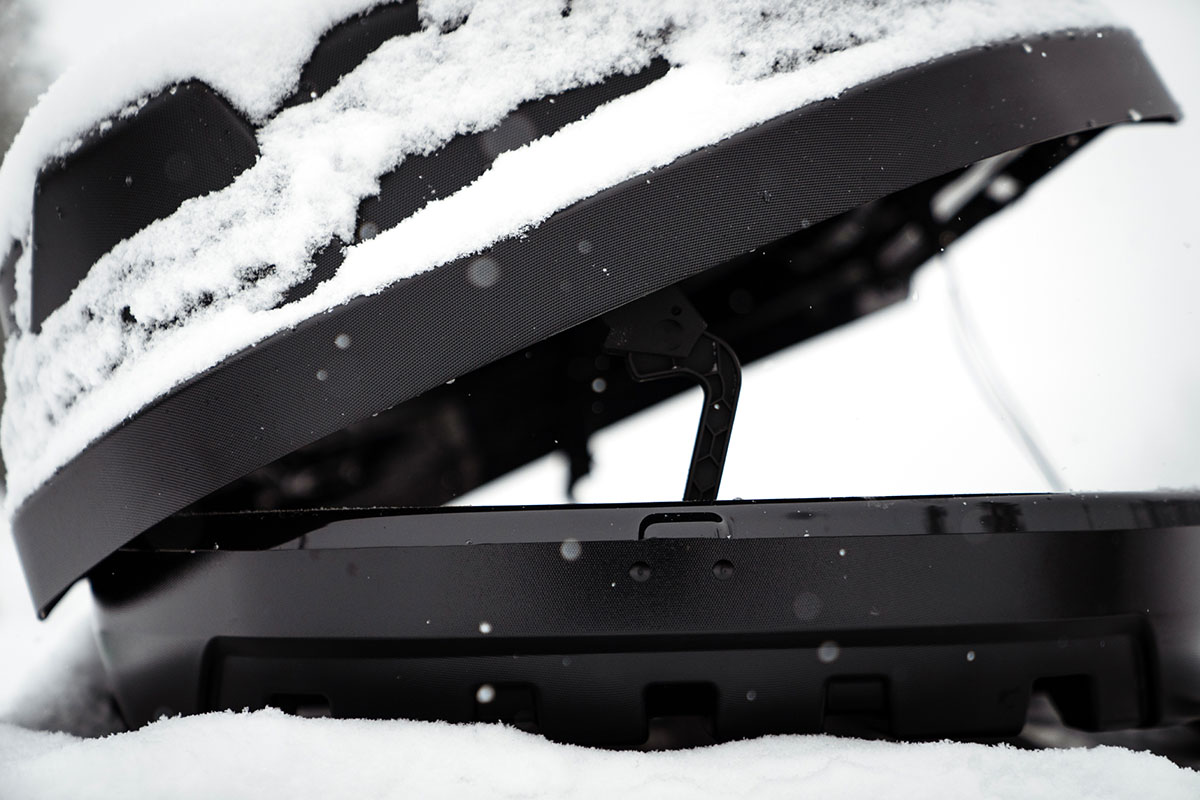
One compromise of the revised shape and roomier interior of the SkyBox NX is that road noise has ticked up noticeably. Whereas the bullet-shaped Carbonite model only really generated extra noise on windy days, there’s a near-constant hum from the blunter-nosed NX at highway speeds. It’s admittedly not excessive and will likely fade to the background for most, but it’s nevertheless a notable downside. And it’s worth mentioning that the extra noise was evident on all three vehicles that we mounted the box to (VW Golf Alltrack, Jeep Grand Cherokee, and Subaru Ascent).
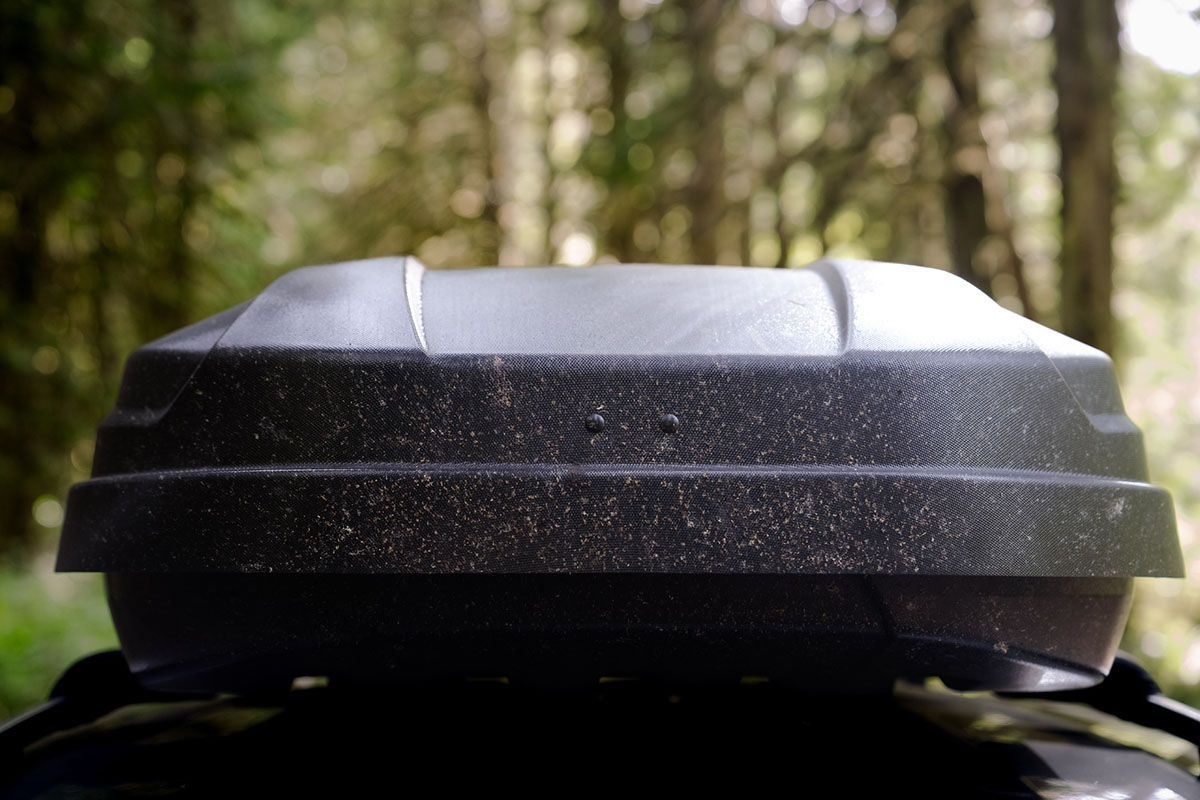
If aerodynamics and a quiet ride are top priorities, we’ve found that higher-end designs like the sleek Thule Motion 3 L ($950) or Yakima’s low-profile GrandTour Lo ($979) are significantly quieter (although the GrandTour compromises on storage space). On a positive note, the SkyBox’s gas mileage hit has been similar to the old Carbonite: roughly 1 to 3 miles per gallon lower on extended highway trips, which isn’t bad considering the size of the roof box.
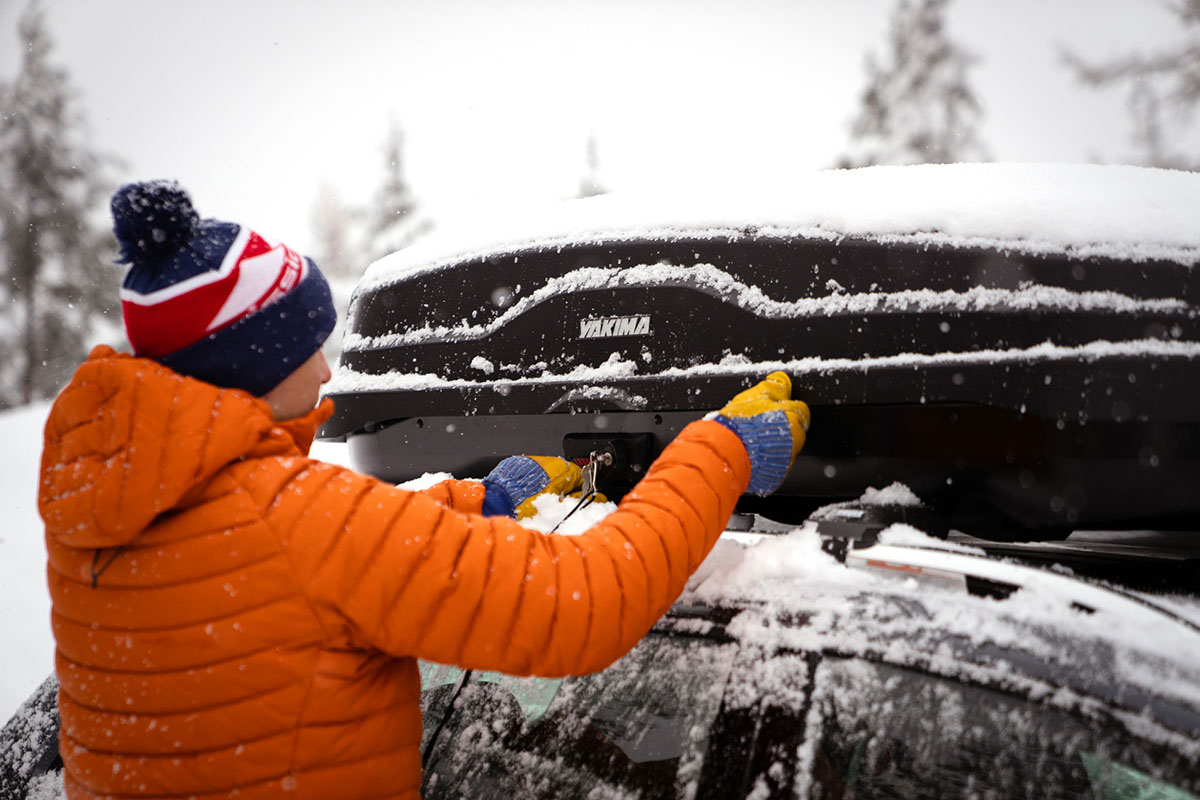
Like a lot of products we’ve tested from Yakima, the SkyBox NX 16 is clearly well made: Everything from the textured lid and base, hinges along the interior, and mounting hardware has a solid and quality feel. And they’ve reinforced the interior with a sturdy tubular bar at the front of the box, which pays dividends in keeping everything in place and secure on the roof in high winds. It’s true you can go even more premium in the roof box market with upgrades like glossy paint finishes, extra stiffening along the lid, and even integrated solar panels, but the SkyBox lands in a really desirable middle ground between price and performance.
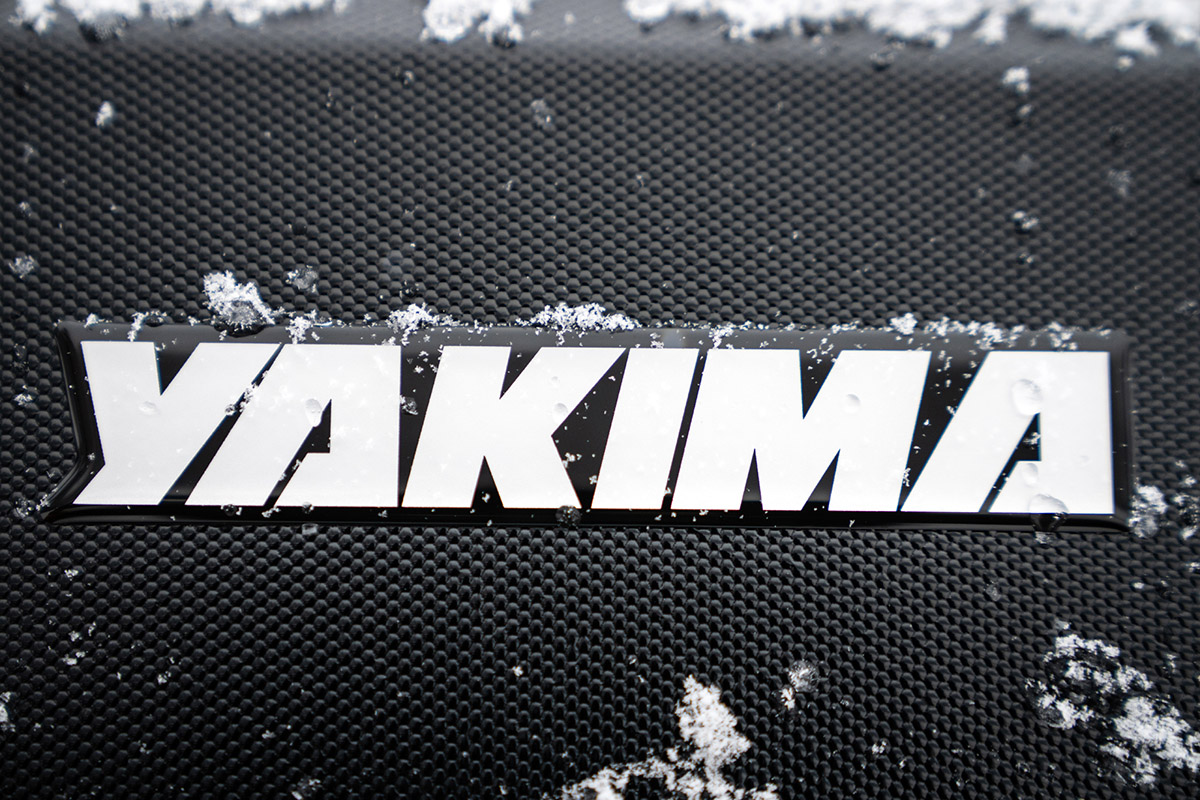
Thus far in testing, the SkyBox NX 16 has held up great. It’s easy to clean—a plus since it’s a bug magnet certain times of the year—and still looks and functions like it did the first day. If Yakima could resolve the icing issue with the key core, it’d be an across-the-board thumbs up from me. Finally, it’s worth noting that the SkyBox comes with a lifetime warranty (wear and tear not included), and Yakima offers replacement parts, too.
A nice surprise with the latest SkyBox NX is that Yakima incorporated their high-end mounting hardware (also found on the pricier GrandTour and CBX models). The benefits are twofold: The floor is significantly flatter so you can fit more gear inside, plus the setup process is a breeze. Replacing the old, large plastic mounting clamps is a fully modern, low-profile mount with an integrated bolt. Using the included torque tool, you simply loosen the bolt on all four clamps, set the box on your vehicle’s roof in front of the crossbars (with a partner), and then slide it into place (the clamps have a lot of fore and aft adjustability to avoid the hatch).

It usually requires a couple checks and small tweaks to make sure the SkyBox is straight, but otherwise, the process has a short learning curve. And the torque wrench takes some of the guesswork away: It clicks to let you know when the clamps are secure over your crossbars (Yakima recommends turning until you hear three clicks). Of note: You’ll need to find a good place to store the torque wrench—there’s technically a spot inside the box, but we prefer to keep it more securely in our glove box. With a little practice, we’ve been able to transfer the box between vehicles in under 10 minutes from start to finish. For a detailed breakdown of the process, here’s a link to Yakima’s instruction manual.
Unlike in the past, cross bar compatibility is rarely an issue with modern rooftop cargo boxes. In the case of the SkyBox NX, Yakima claims its open clamps will work with their Streamline crossbars, factory bars that come from the vehicle manufacturer, and any aerodynamic sets. My vehicle had Thule’s AeroBlade system, and while Yakima’s fit guide doesn’t explicitly state it will work (it would fall into the “aerodynamic” category), the box fits seamlessly. It’s always best to reference the fit guide prior to buying, and we highly recommend going through the process of measuring if there will be any potential hatch interference.
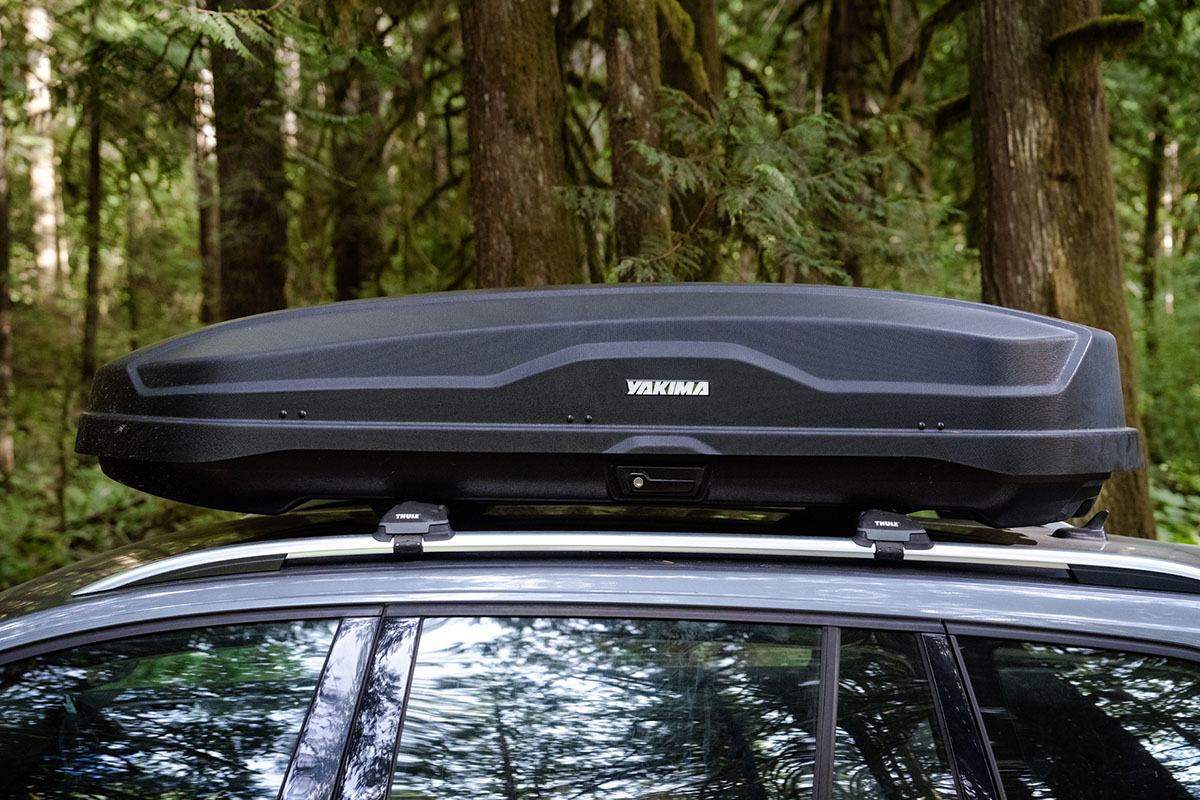
We tested the 16-cubic-foot version of the Yakima SkyBox NX, and it also comes in a larger 18-cubic-foot model for $50 more. As we mentioned above, the SkyBox NX 18 will be the better match for many winter sports enthusiasts, as the 16’s shorter length limits its ability to haul skis. For reference, the larger version can carry skis up to 195 centimeters long, while the SkyBox NX 16 maxes out at 175 centimeters. If your skis are longer than that or you plan to haul multiple pairs at the time, the SkyBox NX 18 is the safer bet to minimize damage.

| Roof Box | Price | Gear Capacity | Dimensions | Access | Skis | Weight |
|---|---|---|---|---|---|---|
| Yakima SkyBox NX 16 | $749 | 16 cu. ft. | 75.5 x 35 x 16 in. | Dual | 175cm | 47 lb. |
| Thule Force XT L | $750 | 16 cu. ft. | 74.75 x 33 x 18 in. | Dual | 175cm | 41 lb. |
| Thule Pulse L | $650 | 16 cu. ft. | 76 x 33 x 16.5 in. | One | 181cm | 36 lb. |
| Yakima GrandTour 16 | $879 | 16 cu ft. | 79 x 35 x 18 in. | Dual | 185cm | 51 lb. 8 oz. |
| Inno Wedge 660 | $690 | 11 cu. ft. | 80 x 33 x 11 in. | Dual | 185cm | 42 lb. |
Yakima’s SkyBox NX 16 offers an impressive balance of interior space, ease of installation, and build quality for the price. Within the roof box market, Thule's Force XT L is the SkyBox’s closest competitor: It matches it in carrying capacity at 16 cubic feet, sports key features including dual access and integrated locks, and is quick and easy to install and remove. The Force XT also has the same maximum ski length (175cm), although it’s a little taller at 18 inches. That said, the SkyBox wins out in usable interior space with its lower-profile mounting hardware—the Thule’s is quite a bit taller and bulkier by comparison—which leads to a flatter floor. Additionally, we don’t love the Thule’s LockKnob mechanism, which is difficult to toggle and puts more strain on the lock than the Yakima (although the icing issue we had with the SkyBox is a notable downside). Given these drawbacks and the nearly identical price, we give the overall edge to the SkyBox.
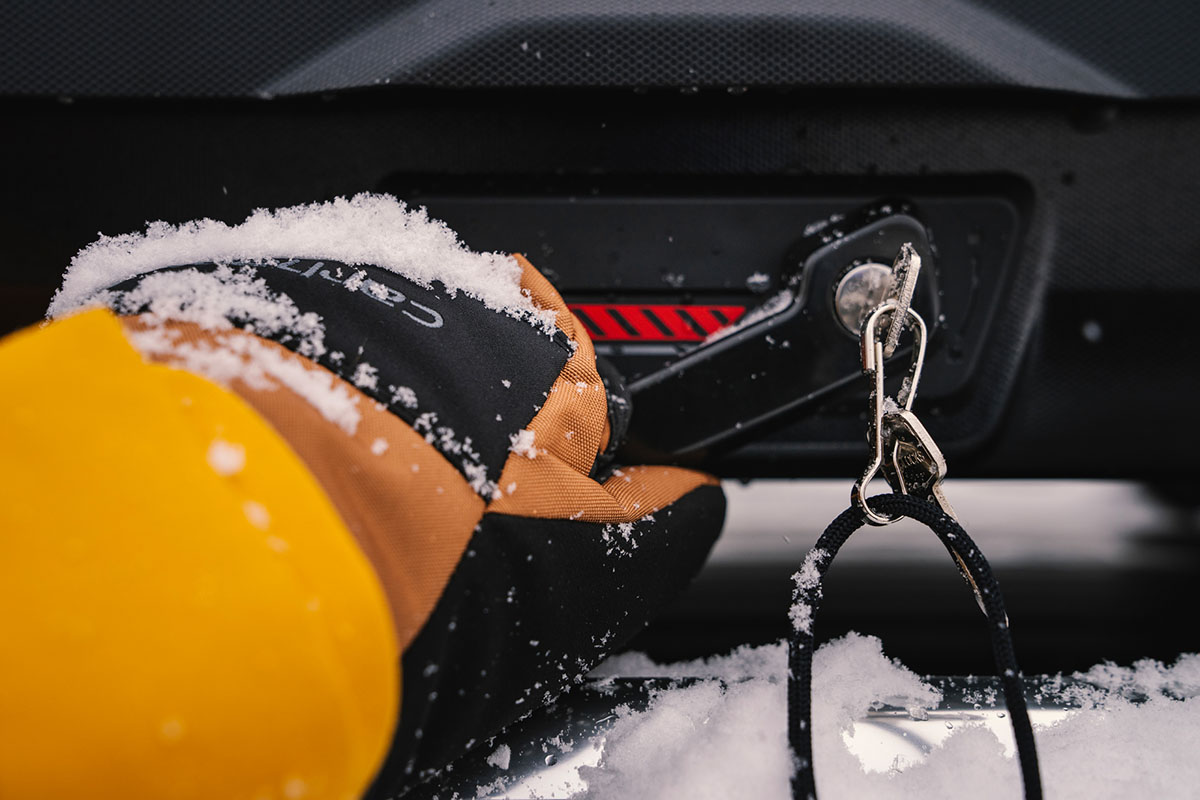
Another Thule design to consider is their cheaper Pulse L. Compared to the SkyBox, the Pulse boasts the same amount of capacity at 16 cubic feet, has very similar dimensions (it’s a little longer and taller but 2 in. narrower), and checks in significantly lighter at 36 pounds. It can also accommodate skis up to 181 centimeters long compared to 175 centimeters for the Yakima. However, the Pulse can only be opened from the passenger side, which is a sizable compromise in convenience (we really like the dual access on the SkyBox). The Thule will save you around $100, but we think the SkyBox’s added access point is worth the weight and price penalties.
Jumping to Yakima’s in-house offerings, the GrandTour 16 offers the same capacity in cubic feet but is a step up in their lineup and costs an additional $130. For the price, you get a higher-end glossy shell, a quieter ride, and a more ski-friendly shape (up to 185cm). The rest of the build stacks up similarly well, including quality mounting hardware with integrated tie-down points, a flat floor, and dual access to the interior. In the end, a strong case can be made for both models, but we think the GrandTour’s upgrades will be worth the price penalty for many.
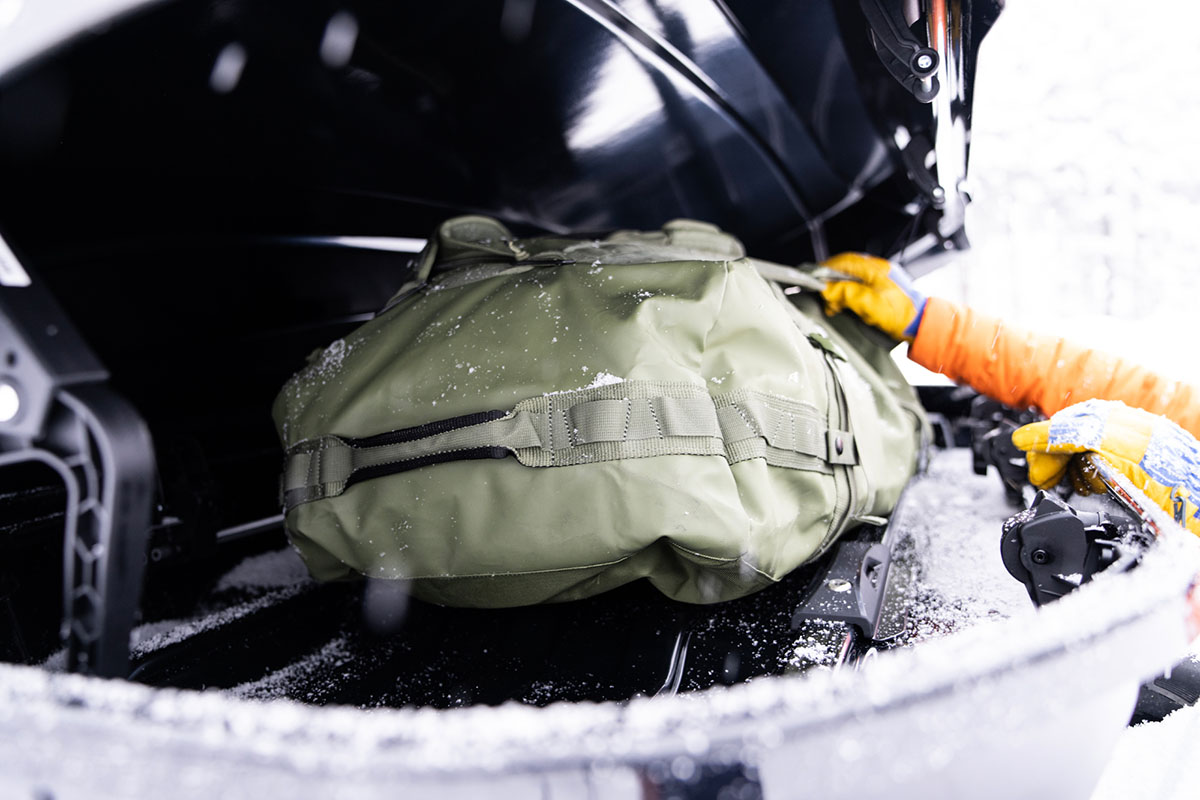
A final alternative to consider is Inno’s Wedge 660, which is notably smaller than the SkyBox NX 16 with just 11 cubic feet of interior capacity. It’s also considerably shorter at 11 inches tall and not ideal for hauling bulky gear for road trips or camping. That said, at 4.5 inches longer than the SkyBox, the Wedge gets the clear edge for carrying skis (it can accommodate six to eight pairs up to 185cm long). It’s also lighter by 5 pounds and well made throughout. We think most folks will be happier with the larger and more well-known Yakima, but the Wedge has its appeal for skiers who don’t mind going smaller.